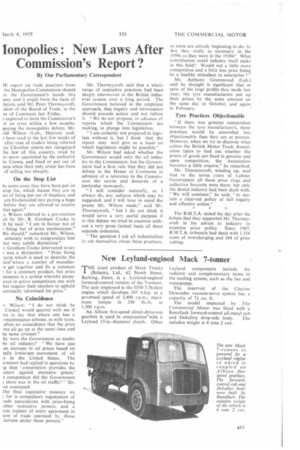lonopolies : New Laws After Commission's Report?
Page 51

If you've noticed an error in this article please click here to report it so we can fix it.
By Our Parliamentary Correspondent
I E report on trade practices from the Monopolies Commission should in the Government's hands this mer, and it might form the basis of ,lation, said Mr. Peter Thorneycroft, ident of the Board of Trade, in the Sc of Commons last Friday.
!. expected to have the Commission's rt on tyres within a few months. pening the monopolies debate, Mr. old Wilson (Lab., Huyton) said: e have read in the last few weeks of after case of traders being referred tar Chamber courts not recognized the law of this country, tried by es never appointed by the authority he Crown, and fined or put out of ness when their only crime has been of selling too cheaply.
On the Stop List
In some cases they have been put on stop list, which means they are in t'er of being put out of business, and are blackmailed into paying a huge before they are allowed to receive lies again."
r. Wilson referred to a pre-election ch by Mr. R. Gresham Cooke in :It he said: "1 am in favour not of fixing but of price maintenance." We should," remarked Mr. Wilson, certainly wish to congratulate him hat very subtle distinction."
r. Gresham Cooke intervened to say
was a distinction. "Price fixing term which is used to describe the ionwhere a number of manufac3 get together and fix a common for a common product, but price nenanCe is a system whereby manutrers in active competition one with her require their retailers to uphold tationally advertised list price."
No Coincidence r. Wilson: "I do not think he
Cooke] would quarrel with me if :re to say that where one has a :-maintenance scheme, as with tyres, often no coincidence that the price rres all go up at the same time and he same amount."
hy were the Government so tender he oil industry? "We have just an increase in oil prices based on tally irrelevant movement of oil is in the United States. The ernment had replied to questions by tg that 'competition provides the :ction against excessive prices.' t competition did the Government there was in the oil traffic? " Mr. on continued.
['he final legislative measure we ; for is compulsory registration of rade associations with price-fixing other restrictive powers, and a rate register of every agreement in aint of trade operated by those nations under those powers." Mr. Thorneycroft said that a whole range of restrictive practices had been deeply interwoven in the British industrial system over a long period. The Government believed in the empirical approach, that inquiry and information should precede action and not follow it. "We do not propose, in advance of reports which the Commission are making, to plunge into legislation, • "I am certainly not prepared to legislate without it, but I think that the report may well give us a basis on which legislation might be possible," Mr. Wilson had asked whether the Government would refer the oil industry to the Commission, but the Government had a firm rule that they did not debate in the House of Commons in advance of a reference to the Commission the merits and demerits of a particular monopoly.
"I will consider naturally, as I always do, any subjects which may be suggested, and I will bear in mind the points Mr. Wilson made," said Mr. Thorneycroft, " but 1 do not think it would serve a very useful purpose if in this debate we tried to examine without a very great factual basis all these separate industries.
" The question I ask all industrialists to ask themselves about these practices, as some are already beginning to do, is: Are they really as necessary in the 1950s as they were in the 1930s? What contribution could industry itself make in this field? Would not a little more competition and a little less price fixing be a healthy stimulant to enterprise ?
Mr. Anthony Greenwood (Lab.) said he thought it significant that in spite of the large profits they made last year, the tyre manufacturers put up their prices by the same amount on the same day • in October, and again in February.
Tyre Practices Objectionable "If there was genuine competition between the tyre manufacturers, these practices would be somewhat less objectionable than they are at present. However, when we try to discover what action the British Motor Trade Association takes to find out whether the prices of goods are fixed in genuine and open competition, the Association becomes a little evasive," he remarked.
Mr. Thorneycroft, winding up, said that in the seven years of Labour Government all these price rings and collective boycotts were there, but only the dental industry had been dealt with, "We will continue," he said, "to sustain a clear-cut policy of full inquiry and effective action."
The B.M.T.A. stated the day after the debate that they supported Mr. Thorneycroft in his advice to industry to examine price policy. Since 1947, B,M.T.A. tribunals had dealt with 1,316 cases of overcharging and 164 of price cutting.












































































































